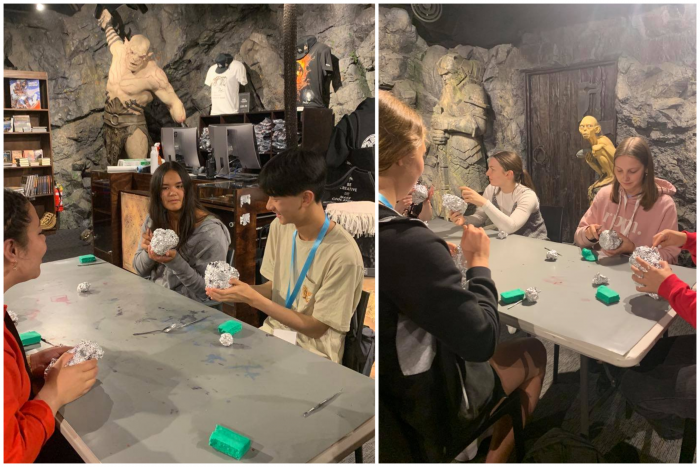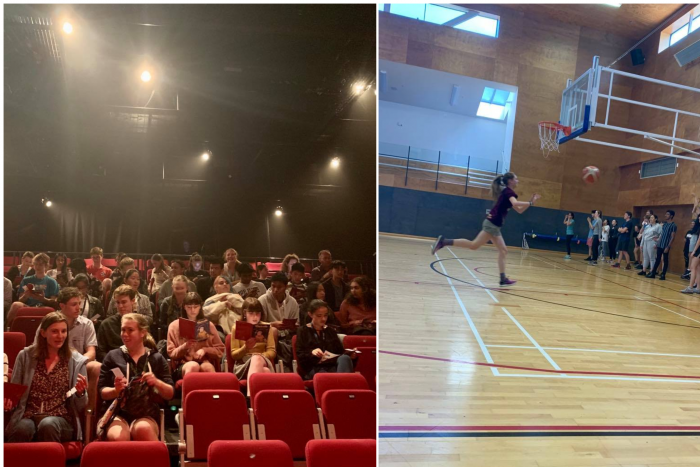News
Published 17 December 20202020 Powering Potential
Last night in Te Whanganui-a-Tara Wellington, 40 tauira presented their solutions to some of the world's biggest problems at Powering Potential.
Powering Potential is an opportunity that brings together tauira students from across Aotearoa to collaborate, research and offer solutions to significant world issues. Mentored by Rutherford Discovery Fellows (RDFs), tauira are given only two days before they have to compile their findings into a presentation.
Highlights reel
Students were grouped into ten groups of four based upon their interests. In their groups, they worked tirelessly over the last few days under their kaiārahi mentors to investigate topics ranging from nutrition to genetics, to conservation and climate change.
Ten Rutherford Discovery Fellows were selected as this year's mentors in celebration of the ten year anniversary of the Rutherford Discovery Fellowships. This provided tauira the unique opportunity to work under experts in their research fields.
See this year's teams, their assigned questions and the participating RDFs:
Team |
Rutherford Discovery Fellow and question |
|
Team Taīko Hannah Matahaere |
Dr Lisa Te Morenga Should we promote replacement of sugar with artificial (non-nutrititve) sweeteners for prevention of obesity and obesity-related diseases? |
| Team Kakī Maia Gasson |
Associate Professor Rob Mckay Depending on future carbon emissions into the atmosphere, ice sheet melt may contribute significantly to sea level rise by 2100. What are the possible scenarios and implications for NZ, and how can we prepare for these? |
|
Team Whio Libby Haywood |
Dr Damian Scarf
Half of the world's population uses social media. What are the potential benefits and risks of social media for mental health? |
|
Team Pīwakawaka Ellen Tsai |
Associate Professor Logan Walker Our health system tends to wait for someone to become sick before it kicks into action. How can we better utilise genetic data to prevent the onset of disease or guide treatment to avoid adverse events? |
| Team Matuku Alex Crampton |
Dr Michael Knapp
Technological advances of the last decade have increased our ability to decode DNA residues from all sorts environments. The field of environmental DNA (eDNA) is rapidly growing as scientists find more and more applications of DNA data from environmental samples such as water, soil, or other substrates and surfaces. What are current applications of eDNA, and what are potential future applications? |
| Team Kākāpō James Zingel |
Associate Professor Peng Du Eat your vegetables! Charitable trusts such as 5+ A Day encourage all Kiwis to eat a healthy amount of fruits and vegetables everyday. How do we design an app that informs us of what we are eating and educates us on what we should be eating? You should consider aspects such as social impact, privacy, and economic cost of your proposal. |
| Team Toroa
Eugene Bonot |
Associate Professor Cate Macinnis-Ng New Zealand's forests store a vast amount of carbon but this important carbon stock is treated by climate change. What are the climatic factors that threaten forest carbon storage and what can we do to mitigate climate impacts on forests? |
| Team Weweia Tegan Gould |
Dr Jodie Hunter Mathematics has been part of Pasifika’s peoples lives for thousands of years, this includes voyaging and navigation to settle on islands around the Pacific. What mathematical problems would Pasifika people have had to solve to successfully voyage around the Pacific without any modern technology? How could these problems be solved? |
| Team Ruru
Pearl Bir |
Dr Alys Clark What are the tools that are currently used to detect problems in pregnancy? Can you suggest technologies that could be used to improve pregnancy health in communities that do not have easy access to these existing tools? |
|
Team Tawaki Emma Kenney |
Dr Emma Carroll How do we prioritise conservation spending on species and/or ecosystems given limited resources? |
Between research sessions, students also had the opportunity to explore the capital city and spend some quality time with one another. They attended the theatre, sculpted monsters at Weta Workshop, played basketball with former professional basketball player Kenny McFadden and ate lots of kai.
 Sculpting workshop at Weta
Sculpting workshop at Weta Cinderella Pantomime (left) and basketball drills (right)
Cinderella Pantomime (left) and basketball drills (right)
Kia ora! Thank you to all of the tauira and kaiārahi who participated in 2020 Powering Potential. Your innovative and engaging presentations made for an inspiring end to a challenging year! Thank you as well to everyone who came out and watched the presentations.
Powering Potential is hosted by Royal Society Te Apārangi in conjunction with the Ministry of Business, Innovation and Employment (MBIE) and Freemasons New Zealand.
